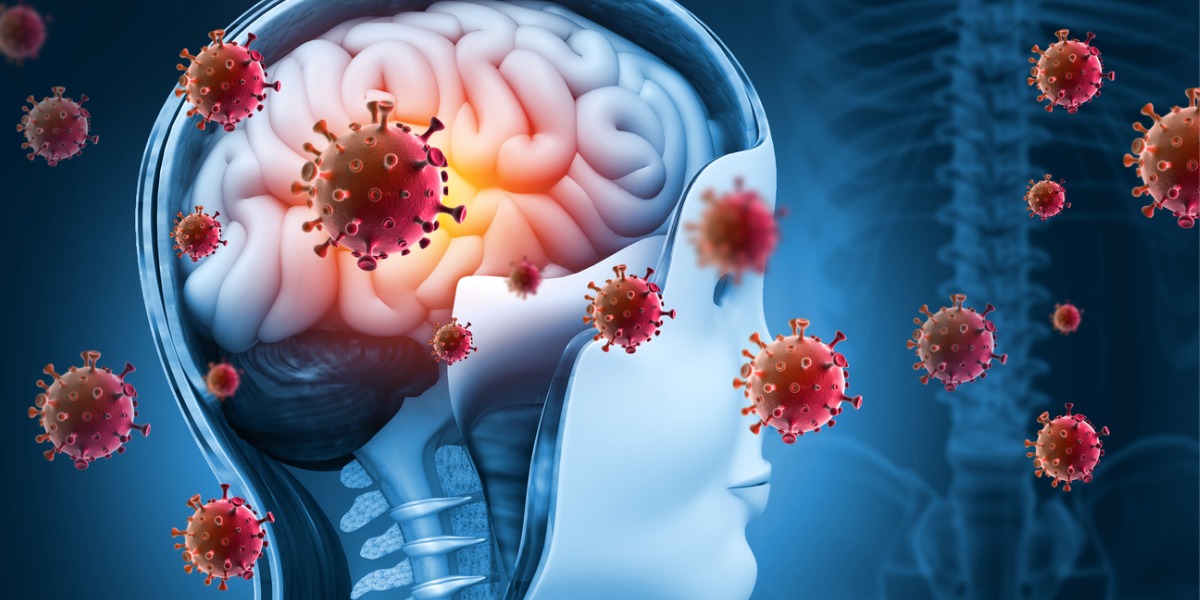Shortly after the beginning of the COVID-19 pandemic in 2020, experts started paying close attention to the potential long-term impact of infection with SARS-CoV-2, the virus that causes COVID-19, but few predicted it might have an impact on mental health disorders or symptoms associated with psychosis.
Efforts to document the effects of the variant called long COVID focused on physical symptoms such as fatigue, respiratory problems, neurological concerns, and digestive issues. While these areas deserve ongoing study, the harms associated COVID aren’t limited to physical distress.
Initial research on the psychological impact of COVID addressed common symptoms of anxiety and depression. These efforts focused on the impact of isolation on mental health, financial worries due to business shutdowns, health fears, and other topics that received widespread attention during the early months of the pandemic.
Over time, the scope of such efforts expanded to include the possibility that COVID may also be a contributing factor for mental health disorders.
For example, a June 2023 advisory from the U.S. Department of Health and Human Services (HHS) noted that psychosis, posttraumatic stress disorder (PTSD), and obsessive-compulsive disorder (OCD) are among the many mental health conditions linked to long COVID.
In this article, we’ll look at one of the areas identified in the HHS advisory: the possible connection between COVID and psychosis.
What Is Psychosis?
Psychosis refers to a variety of disruptions/impairments in the ability to accurately perceive, interpret, and interact with the environment.
Psychosis can result from several mental health disorders, including schizophrenia and schizoaffective disorder. It’s also associated with certain types of substance abuse, traumatic brain injury, and/or various medical conditions, such as Alzheimer’s disease and Parkinson’s disease.
A person who develops psychosis may show the following symptoms:
- Hallucinations: These typically involve seeing and/or hearing things that aren’t really there. Less common hallucinations involve the senses of taste, smell, and touch.
- Delusions: These are fervent beliefs that a person clings to, even though they are easily disproven or obviously disconnected from reality.
- Disorganized speech: This describes an inability to express one’s thoughts in a logical and intelligible manner.
- Grossly disorganized behavior: This can involve disconcerting actions such as speaking in a childish manner, dressing in a bizarre fashion, or holding one’s body in odd positions.
- Negative symptoms: These may include lack of facial expressiveness, speaking in a monotone voice, or exhibiting no interest in associating with other people.
Hallucinations and delusions are the most common psychotic symptoms, though a person with a psychotic disorder may experience all five of the symptom types described above.
A Brief History of Viral-Based Psychosis
According to a January 2023 review in the Journal of Personalized Medicine, scientists first observed the connection between a virus-based public health crisis and psychosis more than a century ago. This happened after in the aftermath of the 1918 influenza pandemic.
In late 1918, in the New England area, Boston Psychopathic Hospital experienced an influx of patients with psychosis-like symptoms. When psychiatrist Karl Menninger conducted a follow-up study with 50 of these patients six years later, he discovered most of them recovered fully. This suggested a connection between psychosis and the flu.
The authors of the January 2023 review also reported that individuals exposed to viral outbreaks in 2003 (SARS-CoV-1), 2009 (H1N1), and 2012 (MERS) developed psychotic symptoms at a “significantly higher percentage” than members of the general population.
Finally, the authors also noted links between several other viruses and psychosis, including HIV, Epstein-Barr, and cytomegalovirus (CMV).
Can COVID Cause Psychosis?
A team of experts from several organizations in Italy conducted the review we cite above. The research teams looked at a wide range of previously published studies on COVID and psychosis, including a retrospective cohort study involving more than 236,000 COVID patients.
The review team had two general goals:
- To identify both neurobiological and environmental factors that may contribute to elevated rates of psychosis
- To explore the difficulties in establishing a clear connection between COVID exposure and the onset of psychosis among people with no previous psychotic symptoms
Their findings included the following:
- Infectious respiratory viruses may be a risk factor for psychosis.
- Widespread inflammation characteristic of COVID infection can undermine the integrity of the blood-brain barrier. This can alter the generation of new cells and disrupt central nervous system function.
- The SARS-CoV2 virus can enter the brain via several routes, including through the olfactory, trigeminal, and vagus nerves.
- Both viral infections and the activation of the body’s immune system can harm to the hypothalamic–pituitary–adrenal (HPA) axis. HPA axis dysregulation is linked to hormonal abnormalities in people with schizophrenia.
However, though their findings demonstrate that COVID has the potential to cause psychotic reactions, the review team cautioned that existing evidence doesn’t establish a definitive cause/effect relationship.
“Available evidence only supports a biological plausibility for the association between COVID-19 and new-onset psychosis,” they wrote. “However, the bulk of evidence points to the possibility that viral entry in brain structures may facilitate the onset of psychotic behavior in vulnerable persons.”
Prior Research on COVID and Psychosis
About five months before the Italian team published the results of their review, a case-based short review by a group of experts in Romania appeared in the journal Infection and Drug Resistance.
This research team reported the following potential causes of COVID-related psychological damage:
- COVID-19 encephalopathy (infection of the central nervous system)
- Cerebrovascular damage (problems with blood flow to the brain)
- Hypoxia (insufficient supply of oxygen to various tissues throughout the body)
- Prolonged strain on the immune system
- Side effects of medications used to treat COVID infections
They also acknowledged that fear, isolation, and stigma may contribute to psychosis and other COVID-related mental health disorders. However, as the Italian team did, the Romanian researchers emphasized that, while their findings help establish a connection between COVID and psychosis, they don’t demonstrate a clear cause/effect relationship.
“Regarding the link between the SARS CoV-2 virus infection and psychosis, we are still only talking about hypotheses that deserve to be studied on the widest possible scale,” the research team wrote. “Apparently, there are several mechanisms by means of which psychiatric manifestations specific to psychoses would be triggered.”
Protecting Yourself From COVID-Related Mental Illnesses
With researchers unable to determine exactly how (or even if) COVID infection can cause psychosis, no guidance currently exists for protecting yourself from psychosis after a COVID infection.
However, several general best practices can keep your and your loved ones as safe as possible:
- The best way to minimize risk of COVID-related mental health challenges is to avoid contracting COVID. The Centers for Disease Control and Prevention (CDC) compiled a thorough list of best practices to help people reduce their risk of infection.
- Practice fundamental self-care, which includes following a nutritious diet plan, incorporating physical activity into your daily schedule, and getting a healthy amount of sleep. These steps won’t make you immune to either COVID or mental health disorders, but they can improve your ability to manage any physical or psychological setbacks you experience.
- Keep in regular touch with close friends and/or trusted family members. If you can’t get together in the same room, make an effort to talk on the phone, text each other, or video chat. Avoiding isolation should be a vital component of your mental health toolbox.
- Get professional help when you need it. This includes consulting with a medical doctor when you have physical health concerns and meeting with a therapist or counselor when worried about your mental health. You should never feel shame about asking for help to protect your health. Instead, getting professional care is a sign you take your health seriously, and that you have the courage and confidence to acknowledge when you need assistance.
It’s also important to educate yourself about the signs and symptoms of COVID infection and various mental illnesses. Your ability to detect a problem in its earliest stages can prevent a relatively minor problem from escalating to a major health issue.
Get Help for Psychosis in Southern California
If someone that you care about has been experiencing symptoms of psychosis, Crownview Psychiatric Institute may have the solutions you are seeking. Our dynamic programming is specifically designed to help people whose lives have been disrupted by acute symptoms of complex mental health concerns.
To learn more about our services, or to discuss how we can help your loved one, please visit our Contact us page or call our center today.


 Gianna Melendez
Gianna Melendez Jodie Dahl, CpHT
Jodie Dahl, CpHT